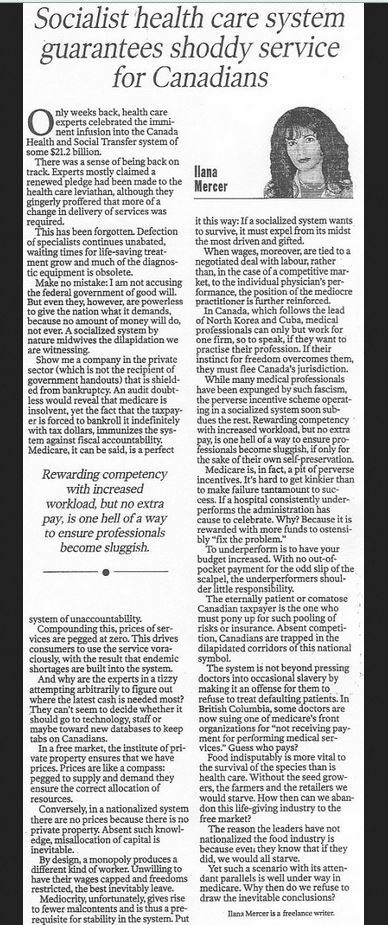Only weeks back, health care experts celebrated the imminent infusion into the Canada Health and Social Transfer system of some $21.2-billion dollars. There was a sense of being back on track. The experts, for the most, claimed a renewed pledge had been made to the health care Leviathan, although they gingerly proffered that more of a change in delivery of services was required. This has been forgotten. Defection of specialists continues unabated, waiting times for life saving treatment grow, and much of the diagnostic equipment is obsolete.
Make no mistake; I am not here accusing the Feds of good will. But even they, however, are powerless to give the nation what it demands, because no amount of money will do, not ever. A socialized system by nature midwives the dilapidation we are witnessing.
Show me a company in the private sector (which is not the recipient of government handouts) that is shielded from bankruptcy. An audit doubtless would reveal that Medicare is insolvent, yet the fact that the taxpayer is forced to bankroll it indefinitely with tax dollars, immunizes the system against fiscal accountability. Medicare, it can be said, is a perfect system of unaccountability. Compounding this, prices of services are pegged at zero. This drives consumers to use the service voraciously, with the result that endemic shortages are built into the system.
And why are the experts in a tizzy attempting arbitrarily to figure out where the latest cash is needed most? They can’t seem to decide whether it should go to technology, staff, or maybe towards new databases to keep tabs on Canadians. In a free market, the institute of private property ensures that we have prices. Prices are like a compass: pegged to supply and demand they ensure the correct allocation of resources. Conversely, in a nationalized system there are no prices because there is no private property. Absent such knowledge, misallocation of capital is inevitable. The attitude, however, seems to be that of “let the people use derrière doctors (proctologists)” if misallocation causes shortages of surgeons.
By design, a monopoly produces a different kind of worker. Unwilling to have their wages capped and freedoms restricted, the best inevitably leave. Mediocrity, unfortunately, gives rise to fewer malcontents and thus is a prerequisite for stability in the system. Put it this way: if a socialized system wants to survive, it must expunge the most driven and gifted from its midst. When wages, moreover, are tied to a negotiated deal with labour, rather than, in the case of a competitive market, to the individual physician’s performance, the position of the mediocre practitioner is further reinforced.
In Canada, who takes her cues from North Korea and Cuba, medical professionals can only but work for one Firm, so to speak, if they want to practice their skills. If their instinct for freedom overcomes them, they must flee Canada’s jurisdiction. While many medical professionals have been driven away by such fascism, the perverse incentive scheme operating in a socialized system soon subdues the rest. Rewarding competency with increased workload, but no extra pay, is one hell of a way to ensure professionals become sluggish, if only for the sake of their own self-preservation.
Medicare is in fact a pit of perverse incentives. It’s hard to get kinkier than to make failure tantamount to success. If a hospital consistently underperforms the administration has cause to celebrate. Why? Because it is rewarded with more funds to ostensibly “fix the problem”. To underperform is to have your budget increased. With no out-of-pocket payment for the odd slip of the scalpel, the underperformers shoulder little responsibility. The eternally patient or comatose Canadian taxpayer is the one who must pony up for such pooling of risks or insurance. Absent competition, Canadians are trapped in the dilapidated corridors of this national symbol.
The system is not beyond pressing doctors into occasional slavery by making it an offense for them to refuse to treat defaulting patients. In British Columbia some doctors are now suing one of Medicare’s front organizations for “not receiving payment for performing medical services”. Guess who pays?
Food is undisputedly more vital to the survival of the species than is health care. Without the seed growers, the farmers and the retailer we would starve. How then can we abandon this life-giving industry to the free market? The reason the leaders have not nationalized the entire food industry, although they have recklessly regulated aspects of it, is because even they know that if they did, we would all starve. Yet such a scenario with its attendant parallels is well underway in Medicare. Why then do we refuse to draw the inevitable conclusions?
©2000 By Ilana Mercer
The Vancouver Sun
October 26
CATEGORIES: Canada, Healthcare, Labor, Private Property Rights, Property Rights, Socialized Medicine

 print
print